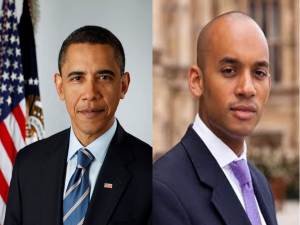 Mandela once said ‘sometimes, it falls upon a generation to be great. You can be that generation’. Nothing can supplant such timeless wisdom but you kind of wish it read like this instead: ‘sometimes, it falls upon certain individuals to propel a generation to greatness and I am one such individual’. But being modest, Mandela would not have brought himself to make it all about him. But the reality is generations can draw lessons from individuals in the same way that individuals can move generations forward in various ways. Both Mr Obama and Mr Umunna, that I have chosen to write about (hence ObamUmunna), are not generations; they are individuals who, in their current occupations, represent people and you could therefore argue that they are representatives of a generation.
Mandela once said ‘sometimes, it falls upon a generation to be great. You can be that generation’. Nothing can supplant such timeless wisdom but you kind of wish it read like this instead: ‘sometimes, it falls upon certain individuals to propel a generation to greatness and I am one such individual’. But being modest, Mandela would not have brought himself to make it all about him. But the reality is generations can draw lessons from individuals in the same way that individuals can move generations forward in various ways. Both Mr Obama and Mr Umunna, that I have chosen to write about (hence ObamUmunna), are not generations; they are individuals who, in their current occupations, represent people and you could therefore argue that they are representatives of a generation.
In his second term as US president, Barrack Obama is the first black president to have ever led the world’s richest and most powerful nation. Born in Streatham (London/UK), Chuka Umunna is a rising black star in British politics. Also in his second term as a member of parliament, he has been the labour party’s shadow secretary of state for business, innovation and skills. Mr Umunna is not the first black person in Britain to ever represent a constituency at that level. What is particularly interesting about him is that despite having a real chance of getting elected as the labour party leader following Ed Miliband’s resignation and perhaps go on to become the first black British prime minister, Mr Umunna instead withdrew from the race just days after making the announcement that he was running for the top job. His decision attracted both criticism and praise. He put it down to the increased level of media scrutiny on both him and those closest to him that prompted his U-turn.
We all have difficult decisions to make in life. However, in the light of what I call ‘the Obam’Umunna conundrum’, society and especially the black community needs to approach self-actualisation a little bit differently.
Given a history of oppression, slavery and segregation, it sometimes makes sense to relish the opportunity that black month (in October) provide to celebrate the courage shown in the face of adversity. It is understandable that a people would dig deep to find some of its role models (la crème de la crème) to showcase the bravery and courage to break social, economic, political, and intellectual barriers. Obama is a modern day example. He has ventured where no other black person had gone. Let’s say that becoming an American president is the highest you can go. The generation has finally become great. What next then?
Mr Umunna seems to be my answer to the above question. His withdrawal from the labour leadership race seems to me to be the new frontier to greatness that, not only the chosen few but also the billions or so black and non-black people can aspire. The new greatness is the call for (black) people to stop chasing after socially constructed greatness at the expense of their true self actualisation. Since the wave on independence in the 1960s on the African continent, black history month is a non-event since Africans are running their own affairs. This autonomy is of course debatable given what some see as new forms of colonialism. But Africans are also suppressed by their own leaders. What Mr Umunna represents that should be the focus of events like ‘black history month’ therefore is to provide a voice that enables individuals to be themselves, to fulfil their aspirations even if that means not reaching socially constructed greatness. To let go of power when the time is right according to the law, unlike what we see in some parts of Africa and even reduce the length of one’s stay in power as president Macky Sall of Senegal is doing. So there you go, ObamUmunna is the new paradigm to greatness!